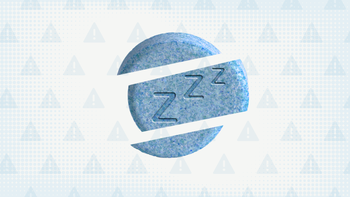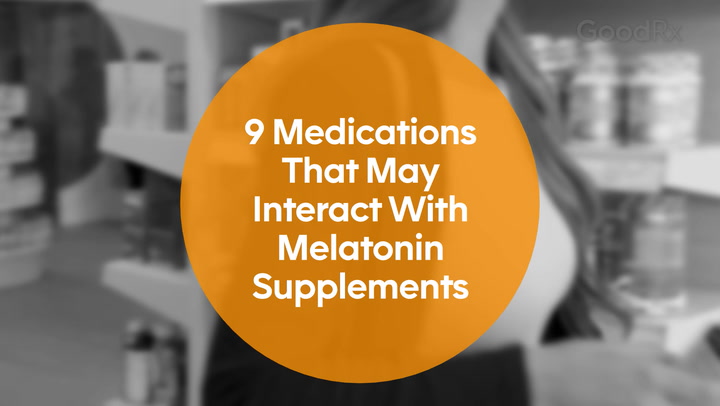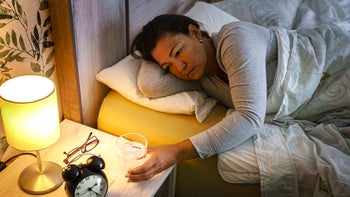
Melatonin Overdose: What You Should Know
Key takeaways:
Melatonin is a dietary supplement that many people take to help with sleep. It’s generally safe for adults at a typical dose of 3 mg to 5 mg daily. Doses over 8 mg aren’t recommended, as they can make side effects more likely.
A melatonin overdose isn’t likely to be life-threatening. But it could cause side effects such as headache, nausea, and dizziness or drowsiness.
If you’re concerned about how much melatonin you've taken, contact your healthcare provider or call Poison Control at 1-800-222-1222. If you’re having trouble breathing or you’re unable to wake up someone who has taken too much melatonin, seek emergency care right away.

You just finished working the late shift and have to be up early tomorrow morning. But you just can’t seem to fall asleep. And this isn’t the first time your work schedule has interfered with your sleep. You’ve thought about taking over-the-counter (OTC) sleep aids or calling your healthcare provider about prescription sleep medication. But maybe a supplement with melatonin seems like a better place to start.
Even though melatonin supplements are considered “natural” products, there are still risks associated with taking them. And it’s not always clear how much to take, or how much melatonin is too much. Let’s take a closer look at the risks of taking too much melatonin.
What is melatonin?
Melatonin is a hormone that your brain naturally makes to help control your sleep-wake cycle. Your brain releases more melatonin when it’s dark outside to let your body know it’s time for sleep. In fact, you release 10 times more melatonin at night than during the day.
Even small amounts of light, such as from a smartphone or laptop, can cause your body to make less melatonin. A drop in melatonin levels may signal your body to stay awake, even at night. This can cause trouble sleeping due to lower melatonin levels than usual.
Can you overdose on melatonin?
Yes — but it’s not likely to be life-threatening if you do. Other sleep medications can cause a dangerous level of sedation if you take too much. But there’s no evidence that this happens with melatonin on its own.
There are case reports of serious health problems in adults who combined a large amount of melatonin with other sedating medications or substances such as alcohol. So the risk of overdose may be higher if you combine melatonin with other substances.
Keep in mind that even though a melatonin overdose is unlikely to be fatal, it can still cause side effects. We’ll cover these side effects in the next section.
What happens if you take too much melatonin?
When taking melatonin supplements, it’s important to know the possible side effects that can occur. These side effects are more likely if you take high doses of melatonin, and include:
Headache
Nausea
Drowsiness (including next-day drowsiness)
Dizziness
Vivid dreams
Diarrhea
You can often manage these side effects at home. But if you’ve taken a large amount of melatonin or your side effects are severe, you may need medical attention. If you or a loved one takes too much melatonin, it’s best to contact your healthcare provider or call Poison Control at 1-800-222-1222. They’ll help decide what your next steps should be.
Is it OK to sleep if I’m feeling side effects from too much melatonin?
If you take too much melatonin, you may feel drowsy, and it may be difficult to stay awake. According to Poison Control, it’s OK to sleep if you’ve taken a high dose of melatonin. But it’s best if you can follow these three steps:
An adult should stay with you until you’re fully rested and awake.
The person staying with you should wake you up every 30 minutes or so while you’re sleeping.
If your breathing becomes irregular or they’re unable to wake you, your observer should call 911.
How long does melatonin last in the body?
Melatonin’s effects can last several hours. It takes your body 1 to 2 hours to lower melatonin levels by 50%. This is called the half-life of the medication. Most people won’t feel melatonin’s effects after this point. But it can take much longer (up to 10 hours) to fully clear a melatonin supplement from your system. So some people may continue to feel its effects during that time.
Keep in mind that these times may be different depending on what type of melatonin supplement you take. Extended-release formulations can last longer in the body.
Good to know: It’s best to only take melatonin if you can rest for a full 8 hours. This gives your body time to fully clear it, which can help you avoid next-day drowsiness.
How much melatonin should I take?
Melatonin supplements are available in a wide range of dosage forms and doses. Since it’s not an FDA-approved medication, there isn’t a standard recommended dose.
Dietary supplements, such as melatonin, also aren’t regulated by the FDA the same way as prescription and OTC medications. Melatonin supplements aren’t required to go through safety and efficacy testing. And the amount of melatonin in each product can vary.
In fact, a study of various melatonin products showed that 71% of the melatonin supplements tested contained different amounts of melatonin than what was listed on the label. Some melatonin supplements even contained other substances, such as serotonin.
This lack of regulation can make dosing more difficult, as it’s not always clear how much melatonin you’re taking. It’s best to choose products with a certification from an organization like the United States Pharmacopeia (USP). Your healthcare provider or pharmacist can also help recommend a trusted brand or formulation.
Typical melatonin dosage for adults
It’s best to start with a low dose of melatonin (1 mg to 2 mg) at first. You can then slowly increase the dose to find what works best for you. Most adults take 3 mg to 5 mg of melatonin, but some need higher doses of up to 8 mg. Doses over 8 mg aren’t recommended as they’re more likely to cause side effects. And if you need to take melatonin for more than 6 months at a time, talk to your healthcare provider. There may be a medical issue that’s causing your sleep trouble.
Good to know: It takes a few hours for melatonin to start working, so it’s best if you take it an hour or two before bedtime.
Is melatonin safe for kids?
Melatonin seems to be safe for children and teens, but only if used correctly. It’s best to talk to your provider before giving melatonin to your child. Melatonin may only help kids with certain sleep conditions. Your child’s provider can make sure melatonin is a safe option for them.
It’s also a good idea to keep melatonin in your home out of the reach of children. Accidental overdoses increased by 530% in kids between 2012 and 2021. And children may be more at risk than adults for serious side effects from taking too much melatonin.
What medications interact with melatonin?
Even though it’s an OTC supplement, melatonin can interact with other medications you take. Some medications can raise melatonin levels in your body. Other medications may be less effective if you take them with melatonin.
Some examples of medications that interact with melatonin are:
Warfarin (Coumadin, Jantoven)
Nifedipine (Procardia, Procardia XL)
Nortriptyline (Pamelor)
Citalopram (Celexa)
Z-drugs, such as zolpidem (Ambien) and zaleplon (Sonata)
Benzodiazepines, such as alprazolam (Xanax) and triazolam (Halcion)
This isn’t a complete list of possible melatonin interactions. It’s best to review your medication list with your pharmacist or provider before taking melatonin. They can make sure there aren’t any interactions you should be aware of.
The bottom line
Melatonin is an OTC supplement that’s commonly used as a sleep aid. If you take a large amount of melatonin, it’s not likely to be life threatening. But you may have more severe side effects, such as nausea, headache, and dizziness or drowsiness.
In most cases, you can manage the side effects of too much melatonin on your own. But it’s a good idea to contact your healthcare provider or Poison Control for guidance. If you’re having trouble breathing or you’re with someone who won’t wake up after taking too much melatonin, seek emergency care right away.
For adults, it’s best to start with a low dose of melatonin, and don’t take more than 8 mg daily unless your healthcare provider tells you to. This can help prevent an overdose and lessen the chance of side effects. Don’t give melatonin to children without their provider’s OK.
Why trust our experts?


If you or someone you know is struggling with depression or has had thoughts of harming themselves or taking their own life, know that help is available. The National Suicide Prevention Lifeline (1-800-273-8255) provides 24/7, free, confidential support for people in distress, as well as best practices for professionals and resources to aid in prevention and crises.
References
Erland, L. A. E., et al. (2017). Melatonin natural health products and supplements: Presence of serotonin and significant variability of melatonin content. Journal of Clinical Sleep Medicine.
Labay, L. M., et al. (2019). The importance of melatonin detection in pediatric deaths. Academic Forensic Pathology.
Lelak, K., et al. (2022). Pediatric melatonin ingestions — United States, 2012-2021. Morbidity and Mortality Weekly Report.
MedlinePlus. (2022). Melatonin.
Papillon-Ferland, L. (2019). Should melatonin be used as a sleeping aid for elderly people? The Canadian Journal of Hospital Pharmacy.
Savage, R. A., et al. (2022). Melatonin. StatPearls.
Society for Endocrinology. (2021). Melatonin. You and Your Hormones.
Soloway, R. A. G., et al. (n.d.). Potential uses and benefits of melatonin. Poison Control.
Was this page helpful?
Compare other insomnia drugs
Related Articles
Browse medications
View AllResearch prescriptions and over-the-counter medications from A to Z, compare drug prices, and start saving.























